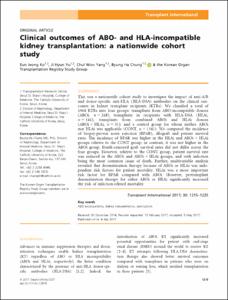KUMEL Repository
1. Journal Papers (연구논문)
1. School of Medicine (의과대학)
Dept. of Internal Medicine (내과학)
Clinical outcomes of ABO- and HLA-incompatible kidney transplantation: a nationwide cohort study
- Keimyung Author(s)
- Han, Seung Yeup
- Department
- Dept. of Internal Medicine (내과학)
- Journal Title
- Transplant International
- Issued Date
- 2017
- Volume
- 30
- Issue
- 12
- Abstract
- This was a nationwide cohort study to investigate the impact of anti-A/B and donor-specific anti-HLA (HLA-DSA) antibodies on the clinical outcomes in kidney transplant recipients (KTRs). We classified a total of 1964 KTRs into four groups: transplants from ABO-incompatible donors (ABOi, n = 248); transplants in recipients with HLA-DSA (HLAi, n = 144); transplants from combined ABOi and HLAi donors (ABOi + HLAi, n = 31); and a control group for whom neither ABOi nor HLAi was applicable (CONT, n = 1541). We compared the incidence of biopsy-proven acute rejection (BPAR), allograft and patient survival rates. The incidence of BPAR was higher in the HLAi and ABOi + HLAi groups relative to the CONT group; in contrast, it was not higher in the ABOi group. Death-censored graft survival rates did not differ across the four groups. However, relative to the CONT group, patient survival rate was reduced in the ABOi and ABOi + HLAi groups, and with infection being the most common cause of death. Further, multivariable analysis revealed that desensitization therapy because of ABOi or HLAi was independent risk factors for patient mortality. HLAi was a more important risk factor for BPAR compared with ABOi. However, pretransplant desensitization therapy for either ABOi or HLAi significantly increased the risk of infection-related mortality.
- Keimyung Author(s)(Kor)
- 한승엽
- Publisher
- School of Medicine (의과대학)
- Citation
- Eun Jeong Ko et al. (2017). Clinical outcomes of ABO- and HLA-incompatible kidney transplantation: a nationwide cohort study. Transplant International, 30(12), 1215–1225. doi: 10.1111/tri.12979
- Type
- Article
- ISSN
- 0934-0874
- Appears in Collections:
- 1. School of Medicine (의과대학) > Dept. of Internal Medicine (내과학)
- 파일 목록
-
-
Download
 oak-2018-0243.pdf
기타 데이터 / 261.81 kB / Adobe PDF
oak-2018-0243.pdf
기타 데이터 / 261.81 kB / Adobe PDF
-
Items in Repository are protected by copyright, with all rights reserved, unless otherwise indicated.